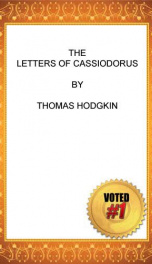The Letters of Cassiodorus

excerpt from the book..LIFE OF CASSIODORUS.The interest of the life of Cassiodorus is derived from his positionrather than from his character. He was a statesman of considerablesagacity and of unblemished honour, a well-read scholar, and a devoutChristian; but he was apt to crouch before the possessors of powerhowever unworthy, and in the whole of his long and eventful life wenever find him playing a part which can be called heroic.[Sidenote: Position of Cassiodorus on the confines of the Ancient andthe Modern.]His position, however, which was in more senses than one that of aborderer between two worlds, gives to the study of his writings anexceptional value. Born a few years after the overthrow of the WesternEmpire, a Roman noble by his ancestry, a rhetorician-philosopher byhis training, he became what we should call the Prime Minister of theOstrogothic King Theodoric; he toiled with his master at theconstruction of the new state, which was to unite the vigour ofGermany and the culture of Rome; for a generation he saw this edificestand, and when it fell beneath the blows of Belisarius he retired,perhaps well-nigh broken-hearted, from the political arena. Thewritings of such a man could hardly fail, at any rate they do notfail, to give us many interesting glimpses into the political lifeboth of the Romans and the Barbarians. It is true that they throw morelight backwards than forwards, that they teach us far more about theconstitution of the Roman Empire than they do about the Teutoniccustoms from whence in due time Feudalism was to be born. Still, theydo often illustrate these Teutonic usages; and when we remember thatthe writer to whom after Tacitus we are most deeply indebted for ourknowledge of Teutonic antiquity, Jordanes, professedly compiled hisill-written pamphlet from the Twelve Books of the Gothic History ofCassiodorus, we see that indirectly his contribution to the history ofthe German factor in European civilisation is a most important one.
Info about the book
Author:
Series:
Unknown
ASIN:
B003YJFIII
Rating:
4/5 (1)Your rating:
0/5
Languge:
English
Users who have this book
Users who want this book
What readers are saying
What do you think? Write your own comment on this book!
write a commentif you like The Letters of Cassiodorus try:
Other books by this author
Do you want to read a book that interests you? It’s EASY!
Create an account and send a request for reading to other users on the Webpage of the book!

